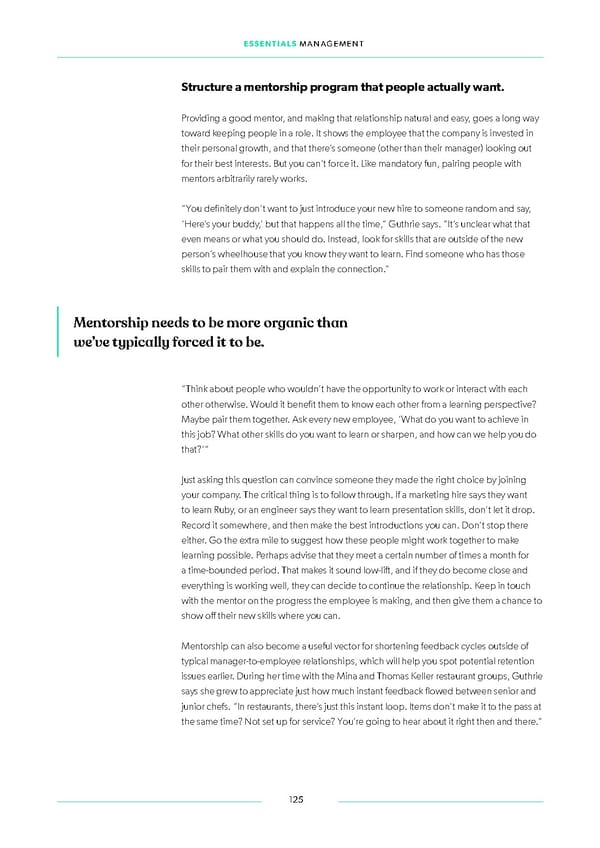ESSENTIALS MANAGEMENT Structure a mentorship program that people actually want. Providing a good mentor, and making that relationship natural and easy, goes a long way toward keeping people in a role. It shows the employee that the company is invested in their personal growth, and that there’s someone (other than their manager) looking out for their best interests. But you can’t force it. Like mandatory fun, pairing people with mentors arbitrarily rarely works. “You deifnitely don’t want to just introduce your new hire to someone random and say, ‘Here’s your buddy,’ but that happens all the time,” Guthrie says. “It’s unclear what that even means or what you should do. Instead, look for skills that are outside of the new person’s wheelhouse that you know they want to learn. Find someone who has those skills to pair them with and explain the connection.” Mentorship needs to be more organic than we’ve typically forced it to be. “Think about people who wouldn’t have the opportunity to work or interact with each other otherwise. Would it beneift them to know each other from a learning perspective? Maybe pair them together. Ask every new employee, ‘What do you want to achieve in this job? What other skills do you want to learn or sharpen, and how can we help you do that?’” Just asking this question can convince someone they made the right choice by joining your company. The critical thing is to follow through. If a marketing hire says they want to learn Ruby, or an engineer says they want to learn presentation skills, don’t let it drop. Record it somewhere, and then make the best introductions you can. Don’t stop there either. Go the extra mile to suggest how these people might work together to make learning possible. Perhaps advise that they meet a certain number of times a month for a time-bounded period. That makes it sound low-litf, and if they do become close and everything is working well, they can decide to continue the relationship. Keep in touch with the mentor on the progress the employee is making, and then give them a chance to show off their new skills where you can. Mentorship can also become a useful vector for shortening feedback cycles outside of typical manager-to-employee relationships, which will help you spot potential retention issues earlier. During her time with the Mina and Thomas Keller restaurant groups, Guthrie says she grew to appreciate just how much instant feedback lfowed between senior and junior chefs. “In restaurants, there’s just this instant loop. Items don’t make it to the pass at the same time? Not set up for service? You’re going to hear about it right then and there.” 125
 Essentials Management First Round Capital Page 124 Page 126
Essentials Management First Round Capital Page 124 Page 126